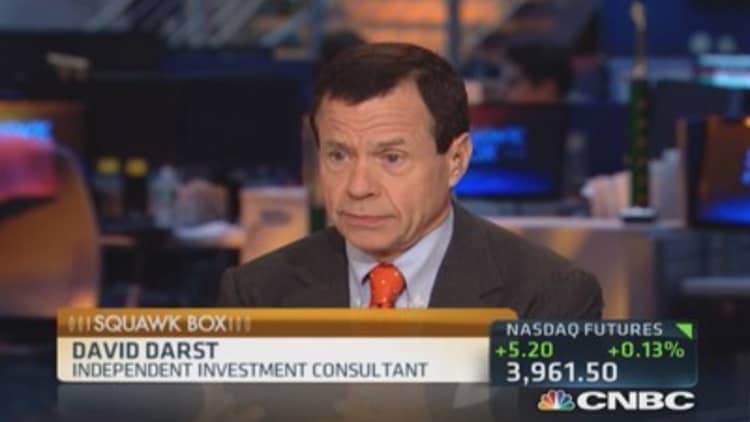
David Darst, senior advisor at Morgan Stanley Wealth Management, likes lists, and he shared his bear market checklist Wednesday on CNBC a day after the Dow Jones Industrial Average dropped 272 points.
On "Squawk Box," he said three of his six indicators of a bear market—a drop of 20 percent from record highs—are flashing a red light.
"So that's why the market is trying to come to terms with this," he continued, but concluded that he believes stocks have more room to run higher after a short pause. That puts him in line with many market watchers on Wall Street.
Here is Darst's bear market checklist:
- Is the Federal Reserve tightening now? No. Economists expect the start of Fed interest rate hikes next summer.
- Recession looming? He said, No (though he did acknowledge the IMF's downgrade of global growth forecast for this year and next).
- Are investors too euphoric? No, according to the American Association of Individual Investors (AAII). The group's latest report showed optimism fell to its lowest level since early August.
- Are long-term stock valuations stretched? Yes, said Darst (though he said valuations are not that stretched in the near term).
- Are banks, small caps and transportation stocks taking heat? Yes. The small-cap Russell 2000, for example, entered correction territory again Tuesday.
- Are bond yield spreads are widening? Yes, he said.
Darst counts 719 trading days since a stock market correction—a drop of 10 percent from record highs. "It can still run further," he said. "The market is [just] basically taking a flu shot."
Read MoreNever, ever do this, Cramer warns

According to AAII, bullish sentiment, defined as expectations that stock prices will rise over the next six months, fell 6.4 percentage points to 35.4 percent this week. Bearish sentiment, expectations that stock prices will fall over the next six months, rose 2.7 percentage points to 30.9 percent.
The group's vice president, Charles Rotblut, told CNBC on Wednesday that when bullish sentiment falls that, counterintuitively, signals more of a buy signal. "If we saw bullish sentiment fall into the 20s that would be a more optimistic sign."


